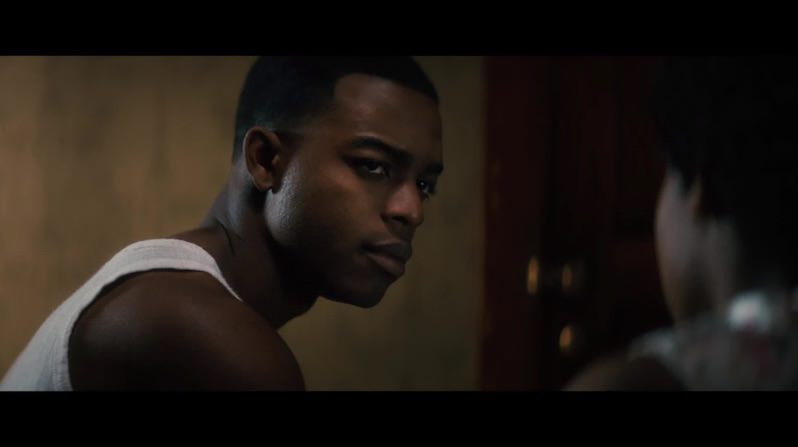Film Review: A Resolute ‘Race’ Through Jesse Owens’ Monumental Story
The movie paints in overly broad strokes, but it captures many of the facts about the history-making track athlete. It also offers a fine perspective on the racial politics of the 1930s and the burgeoning civil rights movement of that day. Stephan James as Jesse Owens in "Race." (IMDB)
Stephan James as Jesse Owens in "Race." (IMDB)
The life and achievements of James Cleveland “Jesse” Owens could scarcely be encompassed in a miniseries, let alone a feature film. “Race,” though, makes a gallant stab at it.
The greatest track and field athlete in American and probably world history, Owens had the spectacular good luck—or bad, depending on your point of view—of rising to the top of his athletic field at the precise moment that Hitler and the Nazi Party were coming to power and the Olympics were being held in Berlin.
Other films have chronicled Owens’ accomplishment in the 1936 games, including a not-bad 1984 TV movie, “The Jesse Owens Story,” with Dorian Harewood, and German filmmaker Leni Riefenstahl’s famous 1938 documentary on the games, “Olympia.” However, “Race”— the title’s double meaning is obvious—directed by Stephen Hopkins, is the closest yet to a comprehensive telling of the Owens story.
Taken in part from Owens’ 1972 memoir, “I Have Changed,” and from biographies of Owens by William J. Baker and Jacqueline Edmondson, “Race” gets a fine perspective on the racial politics of 80 years ago and the burgeoning civil rights movement that helped to forge the film’s principal character.
Born in 1913 in Oakville, a town in north Alabama, James Cleveland immigrated with his family to Cleveland, Ohio, when he was 9, at a time when nearly 1½ million Southern blacks were moving north. According to legend, a teacher asked him his name and James answered “J.C.” in a slow Southern drawl. The teacher thought he said “Jesse,” and that name stuck. Long before high school he discovered a God-given talent for running, which was nurtured by an enlightened track coach at Fairmount Junior High named Charles Riley. (“Race” combines the figures of Riley and Owens’ track coach at Ohio State, Larry Snyder.)
“Race,” though, doesn’t quite convey what a phenom Owens was at an early age: At Cleveland’s East Technical High School he got national attention for equaling the then world record of 9.4 seconds in the 100-yard dash and for setting a long jump record of 24 feet, 9 ½ inches in the 1933 National High School Games in Chicago. He was a star by the time he entered Ohio State, albeit one restricted to the back pages of the newspaper sports section. (Although by consensus the greatest track and field star of his time, he was not offered a scholarship and had to work his way through Ohio State, running—literally, in some cases—a series of odd jobs.)
If the world of track and field didn’t know Owens’ name as of May 24, 1935, they definitely knew it the next day. During the Big Ten Conference championships in Ann Arbor, Mich., he put on the most spectacular show in U.S. college sports history, setting three world records (in the long jump, 220-yard sprint and 220-yard hurdles) and tied the world record for the 100-yard dash. That performance led, inevitably, to the Berlin Olympics.
The film gets in most of the background and isn’t hagiographic about Owens, an immature young man in college who went three years before marrying the mother of his daughter and even then only under pressure. As played by Stephan James (the young John Lewis in “Selma”), Owens in 1936 was far from resembling the cool, assured but wary Jackie Robinson, America’s other great racial sports pioneer, played by Chadwick Boseman in the film “42.” He’s cocksure of his talent but tentative about making his way in a white-dominated world. He needs the guidance, both on and off the track, of his college coach, played with an abrasive swagger by Jason Sudeikis.
Sudeikis is a revelation here. A former sketch comic on television’s “Saturday Night Live,” he has been making his way in films in romantic and screwball comedies but until now hasn’t shown that he can carry a dramatic role of this weight. It’s a bravado performance; his coach Snyder is desperate to have a track and field ringer but not particularly pleased that he is black. (Who needs the aggravation?)
The scenes of the two of them working through to an understanding—Snyder was a former track star whose immaturity ruined his chances to make the 1924 Olympics in Paris—ring true, as do Owens’ brief association with the young German athlete Carl “Luz” Long, who in real life risked the wrath of the Nazi hierarchy by befriending Owens and even offering him advice and counsel during the Olympics. (The young German actor David Kross has limited screen time as Long but gets to the truth of his character in a hurry.)
“Race,” though it picks up considerable steam when the story reaches the Berlin Olympics, often seems disjointed. There’s just too much story to tell, and much of it is oversimplified or glossed over. Jeremy Irons gives a sly and crafty performance as the controversial dark lord of American athletics, Avery Brundage, head of the American Olympic Committee in 1936 and, later, of the International Olympic Committee. The way his role is written, Irons’ Brundage is smart enough to play Nazi politics, particularly when they involve his own company building Berlin’s Olympic facilities. But “Race” makes Brundage seem conflicted when, after Owens destroys the Nazi theories of Aryan supremacy by winning three gold medals, he is forced to remove two Jewish American athletes from a competition. I knew one of those Jewish athletes, Marty Glickman (played by Jeremy Ferdman), who was for decades the voice of the New York Knicks and New York Jets, and he was adamant that Brundage didn’t need much strong-arming from the Nazis to remove Jewish athletes from the U.S. relay team. (Owens replaced Glickman, and the team won a gold medal, Jesse’s fourth.)
The film also equivocates over the character of the legendary German filmmaker Leni Riefenstahl (played by Carice van Houten, known best to American audiences as Melisandre in “Game of Thrones” on television), whose 1935 documentary, “Triumph of the Will,” was the epitome of Nazi propaganda. In “Race,” she is shown heroically defying the reich’s minister of propaganda, Joseph Goebbels, over his orders not to film the long jump event that Owens was sure to win. She later restages the event to include Owens’ moment of triumph.
This is historically accurate, but the portray of Riefenstahl in “Race” hedges on whether she was a Nazi or at least had Nazi sympathies. (Riefenstahl denied any affiliation with the Nazis in her later years, but the record isn’t so clear.)
I do wish that “Race” hadn’t shown Hitler stomping out of his box each time Owens won an event. In real life, Hitler was seen leaving his seat, but it was well before Owens competed, and Owens always maintained that the Führer shook his hand, and, according to friends, he carried a photograph in his wallet of Hitler congratulating him.
“Race” is painted in broad strokes, and the idea that the greatest villain of the 20th century may have acted, on this occasion, like a good sport seems too complex an idea for the filmmakers to deal with. As, for that matter, is the post-Olympic snub of Owens by President Franklin Roosevelt. That FDR did not personally congratulate him, instead letting the Republicans do so, is one of great mysteries of the Roosevelt era. (The Republicans also succeeded in recruiting Jackie Robinson.)
“Hitler didn’t snub me,” said Owens in a 1936 Republican rally in Kansas City, “it was our president who snubbed me. The president didn’t even send me a telegram.”
Life after the Olympics was a disappointment for Owens, who was often reduced to appearing between games at baseball doubleheaders and racing against horses to make a living. In his memoirs, he wrote, “People say that it was degrading for an Olympic champion to run against a horse, but what was I supposed to do? I had four gold medals, but you can’t eat four gold medals.” He invested in business, but in the 1960s he was reduced to working at a gas station. He filed for bankruptcy and was even prosecuted for tax evasion.
There was some good news. Perhaps to alleviate the financial burden of the tax prosecution, the government appointed him a goodwill ambassador, and he toured the world speaking in countries that seemed to remember his Olympic glory better than most Americans did. After his official retirement, he took some pride in noting that he owned racehorses of the type he had competed against.
It took until 1976 for an American president—another Republican, Gerald Ford—to award him the Medal of Freedom.
Owens, a heavy smoker, died of cancer in 1980. In 1990, he was posthumously awarded the Congressional Gold Medal under the administration of President George H.W. Bush.
In his later years, it can be said, Owens moved away from the conservatism he had shown for much of his life. Regretting that he had criticized African-American runners Tommie Smith and John Carlos for their black power salute at the 1968 Summer Olympics, he wrote in his 1972 autobiography, “I realize now that militancy in the best sense of the word was the only answer where the black man was concerned, that any black man who wasn’t a militant in 1970 was either blind or a coward.”
Though some say his vision may have faltered at times, no one ever made the claim that Jesse Owens was either blind or a coward.
Your support matters…Independent journalism is under threat and overshadowed by heavily funded mainstream media.
You can help level the playing field. Become a member.
Your tax-deductible contribution keeps us digging beneath the headlines to give you thought-provoking, investigative reporting and analysis that unearths what's really happening- without compromise.
Give today to support our courageous, independent journalists.






You need to be a supporter to comment.
There are currently no responses to this article.
Be the first to respond.